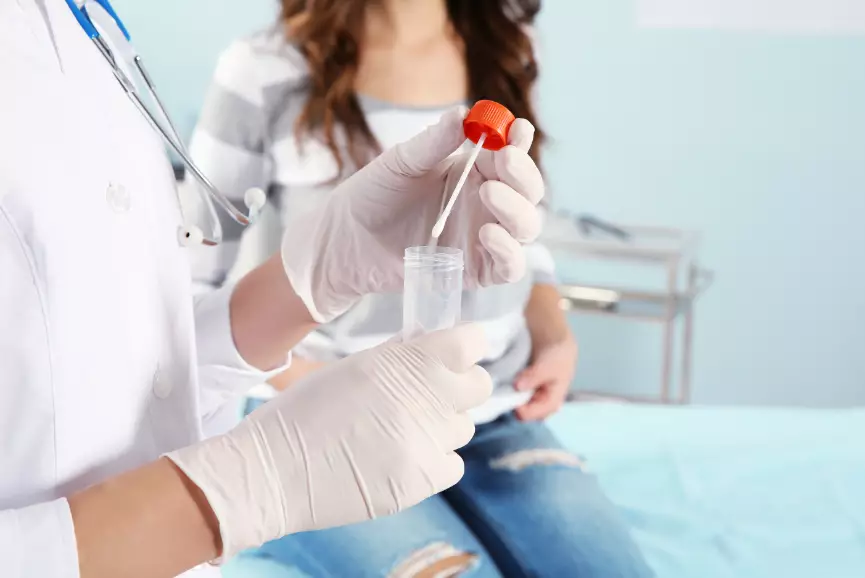
When I had my first smear test two and a half years ago, I didn't feel embarrassed or worried it would hurt. But, I was frightened.
Frightened that the results would be abnormal, frightened of whatever tests I'd have to undergo if they were and frightened that at 25, I would have cervical cancer.
One by one, each of my friends had their smear, and one by one they received normal results. Meanwhile, as I waited to hear about mine, I catastrophised and convinced myself something would be wrong.
Advert
What I didn't know at the time was that I wasn't alone in my fear. Worryingly, Jo's Cervical Cancer Trust recently found that 40 per cent of women who missed their smear test last year, did so because they were scared of the results.
I did go for the screening (FYI for those concerned about the discomfort, I barely felt a thing). In fact, by the time my nurse had finished giving me some hairdresser-worthy small talk, it was over.

In hindsight, it was my lack of understanding over what 'abnormal cell changes' meant that was feeding my fear. And while my test came back normal, one in 20 women *will* have an abnormal smear at some point in their life.
Advert
At Tyla, we don't want any woman to delay - or worse, completely avoid - having their smear test because they're frightened of the results.
So we spoke to three women who have experienced 'cell changes', to fully understand exactly what it means *and* what happens. To help, we enlisted health information manager at Jo's Cervical Cancer Trust, Imogen Pinnell, to break down the different types of results.
The way cervical screening works has changed recently. After having your smear, doctors will first test for HPV - also known as human papillomavirus, which causes 99.7 per cent of cervical cancers. You cannot have cell changes if you do not also have HPV.
Advert
"HPV infects cells, causes them to change and then as they divide, if it's an abnormal cell that's dividing, it's creating more and more abnormal cells," explains Imogen.
"Sometimes, our body just gets rid of them itself and it goes back to normal but sometimes if our immune system doesn't fight that off it can develop into a cancer - this is rare."

If you test positive for HPV, the sample will then be tested for the cell changes Imogen describes. If changes to the cells are found, you'll be invited back for a further examination, known as a colposcopy.
Advert
The result of this will grade your cell changes from one to three which informs whether you should watch and wait (in other words, come back in six months to see if the cells have returned to normal) or if you should have them removed (also referred to as a LLETZ or LEEP treatment).
None of these results mean that you have cervical cancer.
Sara Stammers, 27, from Durham had grade 2-3 cell changes at 24

Advert
When Sara had her first smear, she assumed she would receive a normal result.
But two weeks on from the screening and the marketing executive found out she had 'low grade' cell changes.
"Immediately, you go into overdrive," she explained. "On hindsight, I wish I'd known at the time exactly what it all meant as I think that would have eased my anxiety.
"I was invited for the colposcopy and the results found I had grade two cell changes (also known as CIN2). With this, I had to decide if I wanted to watch and wait or go ahead with the treatment.
"I sat on the decision for a week before I decided on having them removed. Normally, you would have local anaesthetic but I chose general. Once the procedure was over and the cells were sent to be tested, I found out they were actually more severe than first thought, a grade three (also referred to as CIN3) - so I was incredibly relieved I had made the decision.
"Now, I think about what could have been if I'd waited to get my smear. It feels like it's never going to happen to you but it can."
Amber Wells, 26, from Swindon had grade three cell changes after her first smear test at 24. She was concerned about her fertility, but is now four months pregnant

When Amber had her first smear test and found out she had grade three cell changes, she completely "fell apart" in shock.
"The results came in and because I didn't understand the process or the wording that they use, it was very scary. The letter comes with a leaflet on cervical cancer - even though the results don't mean you have it - and I was just an absolute state, I was so upset," she tells us.
"I just didn't know what any of it meant, especially because I had had the HPV vaccine - but it doesn't protect you from all strains of the virus.
"I had the treatment to have the cells removed and then I had to wait for my next smear - six months after the treatment. Luckily, I was given the all clear. Now, I'm back to having them every three years.
"I completely understand why women panic. I was the first one out of my friendship group to have it done and it really put my friends off having theirs, simply because they were frightened.
"One of the big things for me was the risk over how the treatment can affect a pregnancy. If you have more than 10mm of your cervix removed, it can shorten it, which means the cervix can open when it shouldn't, putting you at risk of late miscarriage or premature labour.
"I'm high risk pregnancy because of it but I'm being monitored. There are things that can be done - you can have a cervical stitch - basically stitching your cervix so it can't open - or tablets you insert every day which contain hormones.
"You do think 'what if I'm 25 and I have cancer' but the whole reason smear tests exist is to prevent cervical cancer. If I hadn't had mine who would have known what could have happened."
Fran Saffari, 31, from London had grade 2-3 cell changes after her second smear test at 28

When Fran had her first smear test at 25, it was normal. For that reason, she was completely shocked when her second smear received HPV and abnormal cells.
The blogger explains she found this very confusing and difficult to deal with.
"I burst into tears and completely freaked out. I had my biopsy rather quickly and that confirmed the cell changes were grade 2-3 - which were considered 'high risk'," Fran told us.
"I didn't understand how I could be all clear at my first and then high risk within three years. But HPV can lie dormant in your body (meaning you have no symptoms and it doesn't show up on a test) for years.
"Stress and other factors can re-activate the virus and it can start attacking cells without any symptoms. I had had a kidney infection during the three-year gap, so my immune system had been at a low.
"I had the LEEP treatment to remove the cells soon afterwards. It was really quick and I felt completely at ease. Obviously it isn't the best experience, but it is necessary.
"Six months later I had a follow-up smear and that come back negative and I've just had my next smear which I also received the all clear for. I'm so relieved.
"One thing I've learnt from the experience is that we really need to be talking about this more. When I first found out I had HPV I doubted myself and my experiences, but then I realised it is happening to many other women and it is so common.
"There's a taboo around it simply because it's transmitted sexually, but only a few HPV strains out of hundreds can cause cervical cancer and people live with it their whole lives with no issues whatsoever. It's completely indiscriminate."
If you do one thing this year, book your smear test. And if you're not due yours, urge a friend who is.
For more information and support, visit Jo's Cervical Trust.
Topics: Smear Test, Life News, Cervical Cancer, Health